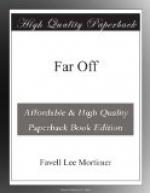The daughter, who was sixteen, was dressed in a skirt of striped silk, with a blue bodice, and silver clasps; and she wore a cap of scarlet cloth, adorned with silver lace—her light hair flowing over her shoulders: yet though so finely arrayed, her feet were bare; for she only put on her red slippers when she walked out. The mother was covered with a loose calico wrapper, and her face was concealed by a thick white veil. The visitor laid some needle-cases at the ladies’ feet, for it is not the custom for them to receive presents in their hands.
The needle-cases greatly delighted the young Hafiza, and her mother. The present was well chosen, because the Circassian women are very industrious, supplying their husbands and brothers with all their clothes, from the woollen bonnet to the morocco shoe. The wool, the flax, and the hemp, are all prepared at home by the mothers, and made into clothes by the girls, who first spin the thread, then weave the cloth, and finish by sewing the seams. Some girls are very clever in knitting silver lace for trimming garments. A girl named Dussepli was famous for her skill in this art, indeed her name signifies, “Shining as lace.”
An Englishman went to the place where she lived to buy some of her lace. He was shown into the guest-house, and he soon saw Dussepli approaching in a pair of high pattens. At first sight there was nothing pleasing in Dussepli but when she spoke she seemed so kind, and so true, that it was impossible not to like her. By her industry in knitting lace, and dyeing cloth, she helped to support her father, who was poor.
THE CIRCASSIAN MEN.—War is their chief occupation. Working in the fields is left to the women, and the little boys, and the slaves. There is, alas! great occasion for the men to fight, as the land has long been infested with many dangerous enemies.
The Russians are endeavoring to conquer the Circassians: but the Circassians declare they will die sooner than yield. Long ago the enemies must have triumphed, had it not been for the high mountains which afford hiding-places for the poor hunted inhabitants. Every man carries a gun, a pistol, a dagger, and a sword; and the nobles are distinguished by a bow, and a quiver of arrows. The usual dress is of coarse dark cloth, and consists of a tunic, trowsers, and gaiters. The cap or bonnet is of sheep-skin, or goatskin.
The boys are taught from their infancy to be hardy and manly. They are brought up in a singular way. Instead of remaining at home, they are given at three years old, into the care of a stranger: and the reason of this custom is, that they may not be petted by their parents. The stranger is called “foster-father,” and he teaches any boy under his care to ride well, and to shoot at a mark. The boy follows his foster-father over the mountains, urging his horses to climb tremendous heights, and to rush down ravines; and appeasing his hunger with a mouthful of honey from the bag, fastened to his girdle. Such is the life he leads, till he is a tall and a strong youth; and then he returns home to his parents. His foster-father presents him with a horse, and weapons of war, and requires no payment in return for all his care.




